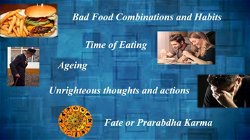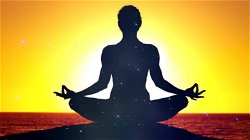Health and Ayurveda, Know Your Physical Constitution
Ayurveda
. 8 min read
This article has been taken from main series- Science of Human Wellness, The Complete Health Series, which is a step by step illustration on Health, Yoga and Ayurveda. Real Yoga and Ayurveda is not only about physical practices but require great insight to have excellent results and there is practical need of knowing about one's own physical constitution, which is either Vata, Pitta, Kapha or mostly combination of these. There are some definitive principles to diagnose these and know exactly what are you made up of and what you should do to overcome common physical limitation. Knowing your Physical Constitution is the first step moving towards better health.
Real Yoga and Ayurveda
Yoga is not only about twisting your body like a rubber doll or following highly insane postures you think can never strike or bend your body like Julia Günthel aka Zlata; as by doing so you can achieve physical health but not mental and emotional well being. Ancient sages have synthesized Yogic and Ayurvedic wisdom in various texts to guide us to follow natural remedies, controlled diet, use incredible healing power of mother nature, to work at deepest level of your being and transcends to reach ultimate.
Understanding Physical Constitution in Ayurveda
Many of us are inherently born with some genetic limitations like indigestion, allergy, feverish, sugar, sickle cell anemia, cystic fibrosis, Sugar, Obesity, Marfan syndrome, cancer etc. which is the legacy we got from ancestors and we go on dragging disease throughout the life. Though we get temporary relief through eating organic food, taking supplements or Modern or Allopathic medicines but not the complete cure. We don’t get cured, not because there is no solution but because there is no holistic approach, we are not directly looking at problem, we are treating side effects not pressing the root cause button. By understanding your Physical and Mental Constitution not only you can solve your problems but will develop gratitude towards mother nature as In Yoga all diseases are just the indications that some fundamental balances have been disturbed and we need to restore the same, in Ayurvedic language we say Doshas you are born with refer to your constitution. Once you understand whether you are a Vata, Pitta, or Kapha or a specific combination of these, you will know what food is suitable for you and which one causes you the most damage, during which seasons your immune system is the best and when it is the weakest, when can you gain weight or lose weight; you can even cure most chronic ailments. In fact, you can enjoy near -perfect health if you get a grip on how nature responds to your nature.
Prakriti and Vikriti, Two Categories of Doshas in Ayurveda
According to Charaka Samhita, "the body, sense, mind and self. The composite of these sustains the quality of life and is called prakriti.
Prakriti is natural functioning of human body, it refers to permanent attributes like you are born fair-coloured, have large eyes, strong masculine body build etc. Vikriti is essentially being deviation from the wholeness and it is thus imbalance; it also represents present state of humours in the your body. Prakriti is your form which first time appeared in mother’s womb, it is your DNA design, so you cannot change this. Constitution of Child is either dependent on his past life deeds or action of his parents during conceiving and before the birth of child, Vedic and Tantric texts explains some healthy ways of conception and care throughout the pregnancy like don’t conceive during day time as child conceived through day time sexual intercourse will be instinctive and aggressive, stress or depression of mother will result in behavioral disorders in child etc. So finally we can say that we have no control over our constitution.
There are seven possible constitutions based on Doshas in Ayurveda
Doshas or principal energies which govern our body and universe, all the three Doshas are different and play very important role and reflect in our overall persona including physical as well as mental existence. As per Ayurvedic Perspective we can divide a human body into seven types which are listed as under: 1. Vata 2. Pitta 3. Kapha 4. Vata-Pitta 5. Pitta-Kapha 6. Vata-Kapha 7. Vata-Pitta-Kapha All individuals contain the combination of three doshas however concentration and predominance of Doshas varies and very few people are absolute Vatas, Pittas or Kaphas. If we can have deep insight on Three Doshas and their traits then we can easily solve questions like Why some people can eat frequently, however others can't? Why some people sleep for only 4 hours however others for 8-10 hours? Why some people gets angry for small reasons? Why do some people suffer from addictions while many don’t?
By Observing the Physical Traits & Mental Attributes listed in Ayurvedic Texts we can identify the Predominant Dosha (Vata, Pitta, Kapha)
Most yogis determine constitution of an individual by pulse diagnosis, however basic constitution or mixture of constitutions can also be Determined by observing your physical traits and mental attributes and you can do it more precisely with following table.
Physical Traits - Body Frame
Vata Dosha : Thin & Slender, Long Limbs, Small Shoulders and Narrow Hips
Pitta Dosha : Medium, Very Symmetrical Body, Handsome Tall boys and Curved beautiful girls
Kapha Dosha : Stout, Stocky with Heavy Bones, Excellent Physical Strength and Stamina
Physical Traits - Joints and Muscles
Vata Dosha : Slender Muscles and Protruding Joints, mostly no Fats
Pitta Dosha : Well Shaped Strong and Flexible Joints and Best Muscular Structure
Kapha Dosha : Well Padded and Strong joints
Physical Traits - Body Temperature
Vata Dosha : Most productive and comfortable in Warm Environments, their body is very sensitive to temperature variations and react quickly
Pitta Dosha : Greatest Physical Stamina in Winters and Heat tires them quickly, so they love winters and cold climates
Kapha Dosha : Feel low on energy and stamina during winters and rains, however comfortable most of the year
Physical Traits - Body Weight
Vata Dosha : Generally underweight and very passionate, so skipping meal is common for them
Pitta Dosha : Mostly perfect weight, any effect of exercise or diet shows on their body in matter of days, so, can easily gain or lose weight
Kapha Dosha : Generally overweight, they gain weight easily but losing weight is very difficult for them
Physical Traits - Hairs (May vary as per race)
Vata Dosha : Dry hairs which tangles easily but they don't become bald generally
Pitta Dosha : Extremely fine and thin hairs and never really jet black, inclined to be bald towards later years
Kapha Dosha : Thick, Oily, Darker and wavy hairs
Physical Traits - Forehead
Vata Dosha : Small forehead and forward hairlines, three lines appears as they age, frown marks are visible
Pitta Dosha : Medium-sized foreheads with wrinkles and lines in no specific pattern, very less frown lines
Kapha Dosha : Largest, lustrous and radiant forehead, no wrinkles
Physical Traits - Eyes
Vata Dosha : Small and sometimes sunken eyes, blink a lot, eyelashes are of normal thickness and length
Pitta Dosha : Charismatic, eyes, penetrating gaze and artistic look
Kapha Dosha : Eyebrows and eyelashes are thick and luxuriant, whites of their eyes are extremely white and prominent
Physical Traits - Lips and Teeth
Vata Dosha : Uneven teeth, thin lips which get dry and chapped easily
Pitta Dosha : Medium sized lips and upper lip is darker than the lower one, good looking teeth but suffer most from cavities
Kapha Dosha : Large and Smooth lips and well formed teeth which require lesser care
Physical Traits - Skin and Complexion (May vary as per race)
Vata Dosha : Darker complexion, Dry and rough skin, need moisturizers, one can see their veins through thin skin
Pitta Dosha : Less Wrinkles, Fair, wheatish or yellowish complexion, suffer skin rashes and sunburn easily
Kapha Dosha : Thick and smooth oily skin, almost no wrinkles until late in their lives
Physical Traits - Hands and Nails
Vata Dosha : Fingers longer than palm, Long and Slender Hands, artistic hands, thin nails which cracks easily
Pitta Dosha : Long proportionate hands, good musicians, palm larger than fingers, nails are square, beautiful, pink and soft
Kapha Dosha : Short, stocky and strong hands, Palm and fingers are of same length, nails are short and thick
Physical Traits - Voice and Speech
Vata Dosha : Low voices as if they are using air from throat and not chest, very talkative
Pitta Dosha : Not much talkative but can argue at great length, they sound sincere and trustworthy, Voices sound slightly nasal
Kapha Dosha : Deep voices, speak slowly, speak with conviction and only after thinking what they are going to say
Physical Traits - Perspiration
Vata Dosha : Perspire only after doing heavy physical exercise, have minimal body odour
Pitta Dosha : Small temperature variations make them sweat, sweat evenly on their body
Kapha Dosha : Perspire Moderately, perspire more in certain parts of body and have stronger sweating odour
Physical Traits - Appetite and Digestion (may vary based on race)
Vata Dosha : Driven by appetite, Sensitive stomach and cannot overeat, high protein food or spicy meals and lactose upset their stomach, develop headaches if miss the meal, their digestion depends on food
Pitta Dosha : Eat at moderate speed as compared to Vatas, they need to eat at regular intervals like three times a day etc. however can skip one meal without experiencing any headache or feeling low in energy
Kapha Dosha : Not driven by appetites, they can skip food or do fasting without any discomfort and due to dietary irregularities they are more prone to diabetes
Physical Traits - Sleep Pattern
Vata Dosha : It is very hard for them to change sleep pattern, wake up at the slightest noises, if they miss the sleep at night or sleep less than regular pattern, they have to recover next day otherwise will remain low in energy during whole day
Pitta Dosha : Require least amount of sleep to feel refreshed, they sleep lightly but soundly, have mostly habit of drinking water during night
Kapha Dosha : Sound sleepers, can sleep for 8-10 hours and then go back to sleep just a few hours later
Physical Traits - Sex Drive
Vata Dosha : Highly passionate for sex but feel exhausted and like to nap after the act
Pitta Dosha : More romantic than Vatas and less performer than Kaphas, they treat sex an act of love and not merely physical intercourse, they sweat more and feel hungry after mating
Kapha Dosha : More enduring than Pittas and Vatas, they are not extremely passionate but meantime cannot skip intercourse, they may have urge to eat something after intercourse
Physical Traits - Seasonal Allergies
Vata Dosha : Little discharge of mucus but noses remain mostly blocked during allergy seasons, when they come in contact with allergens then tend to get dry eyes
Pitta Dosha : Runny nose, red eyes, dry coughs, chest congestion
Kapha Dosha : Watery eyes when suffering from fever, feel worst congestion, Phlegm formation is greatest during the seasonal allergies
Physical Traits - Menstruation
Vata Dosha : Constipation, anxiety, sleep disruption, pain in lower back, cramps in lower abdomen
Pitta Dosha : Longer period than Vatas, burning sensation while urinating, skin rashes and headaches and tenderness in the breasts.
Kapha Dosha : Experience lethargy and torpor, heaviness in body, swollen and tender breasts, periods are not painful like Vatas and Pittas
Physical Traits - Mental Attributes
Vata Dosha : Enthusiastic and extrovert nature, love to spend time outdoors, accommodating and adaptable nature, dream lot during sleep but often forgets
Pitta Dosha : Purposeful, good at debating and head driven people, gets angry very easily, when they sleep- their dreams are mostly filled with violence
Kapha Dosha : Most stable, happy in indoor activities, stick to their well thought out decisions, their dreams are mostly romantic
Having done this analysis you can plan your diet, take precautions for fine health; better you analyse yourself, quicker and better you can heal yourself, as success of all herbs and treatment in Ayurveda is based on how accurately your constitution is determined. This article has been taken from main series- Science of Human Wellness, The Complete Health Series.
More Stories from
Art of Eating and It's Great Health Benefits
Lose weight or gain weight, fight with reflux or acidity or other long ailments by practicing Art of Eating and common sense eating. diet according to season
The Ayurvedic Diet: What to Eat for Wellness and Longevity?
Restoring pH balance in the body is important as imbalance may lead to either acidosis or alkalosis. More sattvic food you eat, healthier your body will be.
Five Great Causes of a Disease and Their Remedy in Ayurveda
Five fundamental causes of disease are: Bad Food Combinations and Habits, Time of Eating, Ageing, Unrighteous thoughts and actions and Fate or Prarabdha Karma.
Sattvic, Rajasic and Tamasic Foods-Yogic Diet and Effect
Whole dietary concept in Ayurveda is divided into Sattvic, Rajasic and Tamasic foods and says that
Need & Advantages of Yoga and Ayurveda for better Health
Yoga and Ayurveda have great scientific, solve medical and scientific mysteries in light of Yoga and Ayurveda. Advantages of Yoga and Ayurveda, Health.






